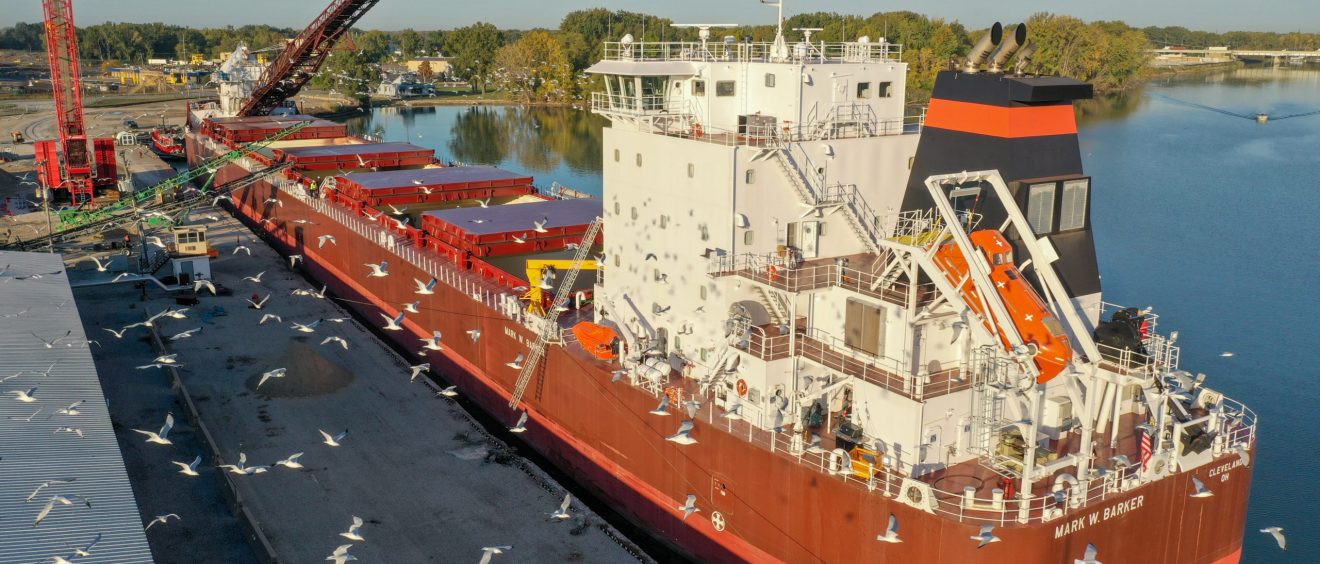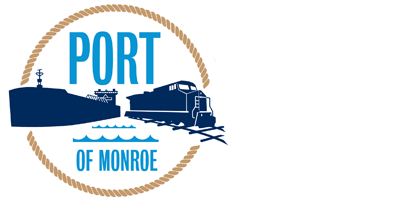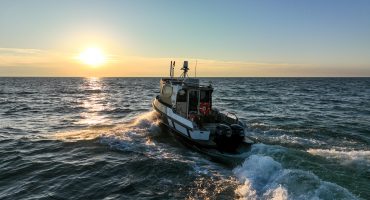
Port of Monroe partners with Newlab to create living lab for emerging technology
Sourced from Newlab LinkedIn page: https://www.linkedin.com/posts/newlabnyc_port-of-monroe-and-newlab-at-michigan-central-activity-7100583558741704704-G0ch?utm_source=share&utm_medium=member_desktop
Today the Port of Monroe was announced as the first partner in the Newlab-Michigan Central testing network, a portfolio of multimodal pilot sites in Southeast Michigan that will serve as platforms to enable rapid testing of new technologies in real-world conditions.
As the on-the-ground project facilitator, Newlab is assembling a network of organizations and startups to drive the recently-launched Multimodal Logistics Challenge, an initiative designed to accelerate cross-sector collaboration around low-carbon, multimodal logistics.
The Port of Monroe is Michigan’s only port on Lake Erie and serves as the gateway to the State of Michigan’s far-reaching multimodal transportation network. Located on the deep-draft frontage of the River Raisin, with direct Class 1 rail access and immediate proximity to major freeways, the Port of Monroe represents the closest convergence of major freight assets anywhere in the region.
Port of Monroe will also soon be the first container terminal in Michigan and with continued support from Newlab and Michigan Central, the most state-of-the-art port on Lake Erie.
In addition to Port of Monroe and Michigan Central, thanks also to The Office of Future Mobility and Electrification at the Michigan Economic Development Corporation, another critical partner in the Port of Monroe multimodal logistics project.
Watch the video:
Sourced from Crain’s Detroit Business: Autonomous ships could soon be sailing the Great Lakes | Crain’s Detroit Business (crainsdetroit.com)
Michigan will be home to the first-of-its-kind testing network of maritime technology as Newlab at Michigan Central in Detroit targets the Port of Monroe for one of its first major pilots.
The project, expected to kick off in earnest in the coming weeks, seeks to untangle a supply chain plagued by inefficiencies while bringing new life to a port that is losing its traditional shipping operations.
The Port of Monroe will be the first of several testing sites for mobility projects in Southeast Michigan planned by Newlab and Michigan Central since the Brooklyn-based startup incubator set up shop in the Book Depository building renovated by Ford Motor Co. in Corktown. The pilot program also represents the first big test of Newlab’s model — to bring together startups, industry and the public sector — in the Michigan market.
The pilot project in the southeast corner of Michigan is expected to include emerging technologies running the gamut of port logistics, from battery-powered rail cars and crane stabilization software to autonomous boats. For the Port of Monroe, it means the opportunity to be on the cutting edge of maritime transportation at a time of great change for supply chains and energy sourcing, said Paul LaMarre, director of the port.
“The Great Lakes maritime industry for decades has operated in somewhat of a time capsule. We have been wholly reliant on the dry bulk cargos that have kept our economy going,” LaMarre said. “However, as we both domestically and globally move to a goal of decarbonization, dry bulk cargo trends are changing.”
That trend is hitting home in Monroe in a big way. DTE Energy Co., Michigan’s largest power utility, said it will phase out the Monroe Power Plant, one of the country’s largest coal plants, entirely by 2032 — sooner than previously expected. With the loss of its largest driver of cargo looming, the port is attempting to reinvent itself as the state’s only container terminal.
The Newlab project aims to assist with that process while also providing startups a coveted opportunity to tinker with their technology in the real world, said Sahil Jain, director of applied innovation at Newlab.
“We are trying to drive the market, industry, government and startups toward realizing the future,” Jain said. “It is a bet, for lack of a better word, on where we think the world is heading.”
Transportation, Jain believes, will eventually move away from a hub-and-spoke model centered on the large coastal ports to a disaggregated network of ports and terminals.
“There’s incredible inefficiency in the system in the way that things move,” he said.
Modernizing a port
Millions of dollars will be invested into the Port of Monroe project over the next couple of years, according to Newlab, but a breakdown of investment was not provided. The project is being supported by Michigan Central and the state’s Office of Future Mobility and Electrification. It aims to leverage public funding already directed at the port, including an $11 million grant from the United States Maritime Administration last year and a $5 million state grant earlier this year to support its pursuit of container shipping.
“By fostering technological advancements and greener solutions for marine highways in Monroe, we not only enhance the state’s supply chain resilience but also drive towards positive economic growth for our friends and neighbors across the region,” Justine Johnson, recently named Michigan’s chief mobility officer, said in a statement.
Newlab is bringing on several startups to participate. One of the first recruits is Mythos AI, a West Palm Beach-based company focused on vertically integrated vessel automation.
“Our goal at Mythos is to turn the supply chain into what looks like a conveyor belt of goods instead of what it is today, which is a complete traffic jam,” said co-founder and CEO Geoff Douglass.
The answer, Douglass believes, is automation. That includes autonomous ships — eventually — but there are a lot of steps to get there. The first is to deploy the “Roomba of ports,” the startup’s autonomous, but manned, vessel that maps out the depth of the water from the surface to eventually create a digital twin of the port.
The data will be shared with the Port of Monroe to inform the size of ships able to navigate into or out of the port, which has an immediate upside as construction crews undergo dredging there, Douglass said.
The longer-term goal is to complete an autonomous voyage from the Port of Monroe to another yet-to-be-identified Great Lakes port, first with the startup’s 26-foot aluminum workboat. The idea is to develop the machine learning and eventually enable autonomous shipping vessels.
“Once you create that brain, you can transfer it to other systems, and that’s what we’re doing,” Douglass said.
The planned autonomous voyage would be a first in the U.S., Douglass said. Autonomous vessels have been tested around the world, but there has never been an inland autonomous navigation from port to port. If the funding and testing go according to plan, the voyage could happen next year. It would be in U.S. Coast Guard compliance and with a person on board able to take over the craft, Douglass said.
“This will definitely be the first of its kind,” Jain added. “There is no autonomous port-to-port movement of vessels happening today. As far as we understand this is not happening anywhere in the world.”
Startups get involved
Mythos will have two of its seven employees based at the port for the project. While there, it will dip its toe in the water for a potential new company base. “Part of it is understanding if we can actually build a tech company there,” Douglass said.
The other startups expected to take part in the pilot are:
- Termina Industries, based in Austin, Texas: A company building AI platforms to digitize logistics yards, giving operators visibility and control over critical transportation assets in real time. They will pilot technology to capture data and track containers/chassis movement at Port of Monroe’s new customs inspection facility.
- Intramotev, based in St. Louis, Mo.: A company developing battery-assisted and self-propelled railcar retrofit technology. Its pilot will focus on an autonomous retrofit of a railcar and piloting of constrained autonomy for conveyance of bulk goods at the Port of Monroe.
- Monolets Inc., based in Mountain View, Calif.: This company is leveraging proprietary Bluetooth wireless mesh technology to provide real-time, item-level asset location and condition data to improve performance, energy efficiency and cost efficiency across supply chains. Monolet will pilot its shipping labels that sense temperature, humidity, GPS, 3D location at the Port of Monroe on cargo and containers.
For the Port of Monroe, the play for becoming a port for shipping containers looks nothing like international ports on the coasts, which accommodate ships carrying 35,000 containers. Ships on the Great Lakes can handle 400 containers at the most, LaMarre said.
“We are talking about value, not volume of containers,” he said. “We’re not importing consumer goods from foreign manufacturers. We will be exporting Michigan-manufactured products and importing critical components to serve Michigan industry. This is a value-added proposition.”
Becoming a testbed for maritime technology will not only allow the port to support emerging companies, it will boost the port’s efficiency and improve its prospects for long-term sustainability, LaMarre said.
He said the port is in ongoing discussions with automakers and auto suppliers about supply chain opportunities at the port, but he declined to offer details.
“We are going to get one shot at this,” he said.



